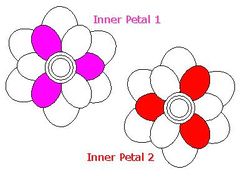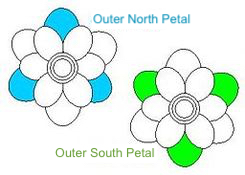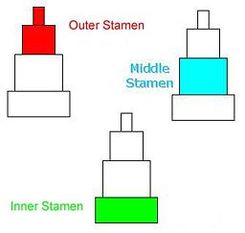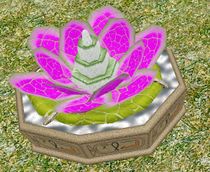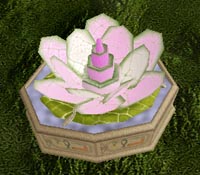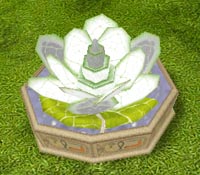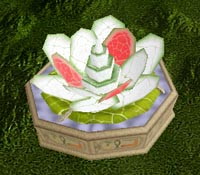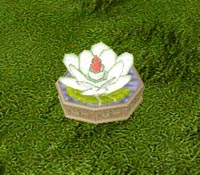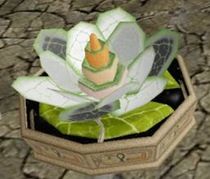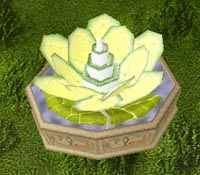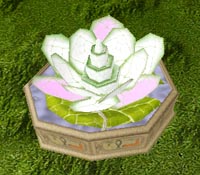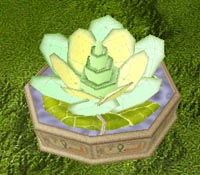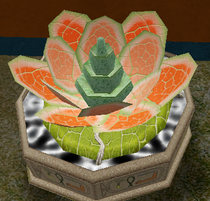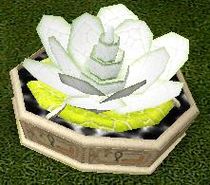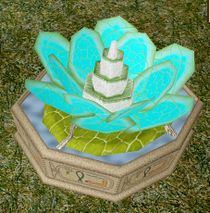Sea Lily
A Sea Lily is a type of Flower. It appears in inventory as "Sea Lily Bulb:<type>" and as a Lily of the Sea once planted.
One bulb per player may be acquired for free from a University of Worship with Horticulture unlocked.
It may be planted anywhere, but requires 100 Water in your inventory to do so (the jugs will be emptied but retained). When planted, it will bloom into a Lily of the Sea in one hour. Once it blooms, it may be fertilized every 2 hours with 20 units of Flower Fertilizer. After 12 fertilizations, you can "Check the bulb for signs of budding" from the flower's window menu. The amount of fertilizations required to detach an extra bulb from a Lily of the Sea is strain and fertilizer dependent.
With Advanced Horticulture there are advanced fertilizers available to make fertilizing sea lilies faster and easier.
Color Regions
A Sea Lily has 7 color regions:
- 4 Petal Regions (2 Outer Petal colors, alternating, and 2 Inner Petal colors, alternating)
- Outer Stamen (the uppermost center section-2 sections )
- Middle Stamen (the middle height center stamen, the lowest one easily visible)
- Inner Stamen (the lowest center section, almost hidden in the petals)
When research calls for petal colors, it will request something like "75%" of a color, which means 3 of the four petal regions that color.
The basic color gene types are magenta, cyan, and yellow. Red is even amounts of magenta and yellow, blue is even amounts of magenta and cyan, green is even amounts of yellow and cyan, and grey/black is equal amounts of all three (white is no color genes). Uneven amounts of the three types will produce various other colors, some of which a normal observer would call "red" or "blue", but if "red petals" is requested by research or a festival, only technically red petals will count. Increasing numbers of each gene result in brighter colors, and there are at least three shades of a given color possible (visible on Blush strain). We note color intensity with levels, for example "magenta 1" indicates a color strength less intense than "magenta 2".
Sizes
They come in three basic sizes, dwarf, semidwarf, and normal. Other sizes can be bred from these through Crossbreeding. The dwarf (GYOR) and giant (ROYG) genes work in slightly different ways, so both extreme and intermediate sizes can be produced. A dwarf gene and a giant gene together produce a semidwarf (a size intermediate between the dwarf and normal sizes).
Known Types
| Strain | Availability Universities of Worship (except as noted) |
Petals | Inner Stamen | Middle Stamen | Outer Stamen | Size | Bulbing Speed |
|---|---|---|---|---|---|---|---|
| Event Prize | Possibly All Magenta 4 | White | White | White | normal | 24 | |
| 75% magenta 1, 25% white | magenta 1 | magenta 2 | magenta 3 | normal | 19 | ||
| Event Prize | 75% white, 25% gray 2 | white | white | gray 2 | normal | 24 | |
| Event Prize | 25% red 1, 25% red 2, 25% red 3, 25% red 4 | red 1 | red 2 | red 4 | dwarf | 24 | |
| Swenett, Kerma | 25% red 3, 75% white | white | white | white | normal | 19 | |
| Event Prize | all white | white | white | red 3 | dwarf | 24 | |
| Event Prize | 25% grey 1, 25% grey 3, 50% white | red 1 | orange 1 | orange 2 | semidwarf | 24 | |
| Western Desert | all yellow 2 | white | white | white | normal | 14 | |
| Philae, West Kush, South Sinai (North) | 25% magenta 1, 75% white | white | white | white | normal | 24 | |
| Blue Nile, Axum, VoK, Suez | 50% green 1, 50% yellow 2 | yellow 1 + green 1 | yellow 1 + green 1 | yellow 1 + green 1 | normal | 24 | |
| Event Prize | Visual analysis:
Inner: 2 Mag., 3 Yellow Outer: 3 Mag., 4 Yellow |
green +
black |
green +
black |
green + black | looks
normal |
TBD | |
| Asyut, Bernike, Red Sea , Valley of the Kings South (-1670,5500) | all white | white | white | white | normal | 24 | |
| Giza | all white | white | white | red 3 | normal | 24 | |
| Event Prize | all cyan 4 | white | white | white | normal | ?? |
Notes
- The color intensities above have been inferred from the known genomes and gene set effects.
- Bulbing Speed refers to the amount of fertilizations required in order to get 1 extra bulb from a flower.
- Bulb may be harvested immediately after the fertilization that makes it available. You still have to wait for the timer to expire start the next growth cycle.
- Flower Genome Theories
Petals
If you select 'Harvest for Petals' in the menu, it destroys the plant and gives you Petals of the Sea.
If you select 'Collect a Petal' in the menu, it gives you Petals of the Sea.
Related Pages
This is a more visual representation of how genomes are distributed in Sea Lilies. The original document is available at: https://tinyurl.com/y5uvr6yk
